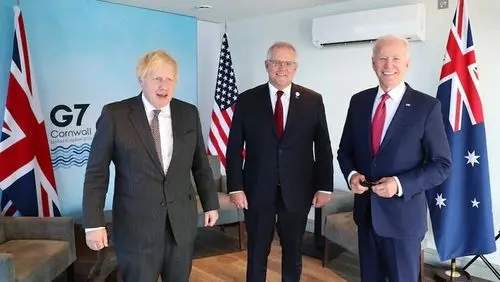Today President Biden announced the creation of a new security partnership between the U.S., the U.K. and Australia. It's a partnership that's focused on the challenges in the Indo-Pacific region. NPR China affairs correspondent John Ruwitch has been following this and joins us now. Hi, John.
JOHN RUWITCH, BYLINE: Hi, Ailsa.
CHANG: All right. So tell us a little more about this announcement.
RUWITCH: Well, President Biden was joined virtually by Prime Minister Scott Morrison of Australia and Boris Johnson of the U.K., and what they announced was a trilateral security partnership called A-U-K-U-S, or AUKUS, is how they pronounce it. They say they're taking old partnerships to a new level and enhancing their shared ability to take on the threats of the 21st century. And so as a first step, what they announced today was that the U.S. and the U.K. are going to work with Australia to help it build a nuclear submarine fleet, which is significant because the U.S. has only shared nuclear submarine technology once before, and it started in 1958 with Great Britain. So they're bringing Australia into this very small club.
Boris Johnson called it a momentous decision. You know, worldwide, there's only a handful of countries with nuclear submarines. They have better capability than conventional submarines. They go faster. They have greater range, more stealth. It's a step up for Australia. And to be very clear, though, what they're talking about is nuclear-powered boats, not boats that are armed with nuclear weapons. And Morrison said that Australia had no intention to acquire nuclear arms.

CHANG: Got it. OK. If we can just step back for a second, what is the U.S. trying to do here?
RUWITCH: This is part of Biden's — President Biden's strategic turn westward toward the Indo-Pacific. The Afghan withdrawal was very much part of that — to free up resources to focus on the Indo-Pacific. And the point of this exercise seems to be twofold. One is, they're boosting deterrence in the Indo-Pacific region — right? — augmenting U.S. capabilities there. And the second is to share the burden. The U.S. has played a major role — the major role since World War II in that region. And again, this fits with the broader strategy. I mean, the U.S. has had what officials say is pretty strong engagement with other countries in the region. Next week, President Biden is hosting leaders of the Quad, which was another security grouping. That's Australia, the United States, Japan and India. A senior administration official who briefed reporters said this is about, you know, maintaining what the Biden administration calls the rules-based order.
CHANG: That is NPR's John Ruwitch. Thank you, John.
RUWITCH: Thank you.












